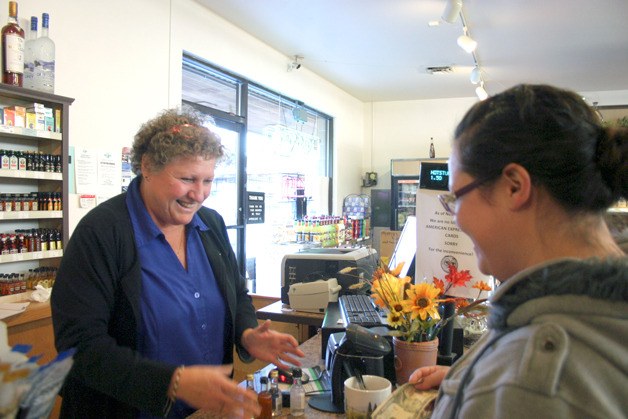CLINTON — Upwards of 30 percent of Jan Neil’s business disappeared over the past six months.
Ever since Initiative 1183 went into effect in June, fewer people are making the trip to Neil’s Clinton Liquor Store. Instead, they buy steaks, milk, toothpaste and Jack Daniels at the Red Apple, the Goose, the Star Store or Payless.
“All we have is this,” Neil said, motioning to her shelves of brandy, rum, tequila, whisky, scotch, vodka, gin and other liquor. “We don’t have the groceries to fall back on.”
Not long ago, there were only three places south of Greenbank to purchase hard liquor. After I-1183 passed in November 2011, that number more than doubled as grocery stores were licensed to sell alcohol, effectively competing with the former contract liquor stores.
More competition has eroded sales at the little stores. Things weren’t great before, even with the state revenue that aided the smallest contract stores. Now, they’re worse, with a 50-percent drop in foot traffic at the Freeland Liquor Store.
“Diversification with everybody selling alcohol has been horrendous on us,” said Ken Vaughan, owner of the Freeland Liquor Store.
“At this stage, it is too early in the progress to tell exactly what the initiative did. It hurt a lot of people.”
Prices have increased since the privatization and simultaneous removal of the state from liquor sales. The initiative included, however, a provision for the state to continue to tax alcohol sales — which Neil saw as the state cutting its overhead and still gaining profit.
The added competition and 17-percent tax squeezed some stores so hard they have filed a lawsuit against the state in Thurston County Superior Court. The Clinton, Freeland and Langley liquor stores are not part of the lawsuit.
But that doesn’t mean the owners are pleased with the change.
Both the Clinton and Freeland store now sell cigarettes. The Freeland store stopped selling cigarettes four years ago, but the passage of I-1183 prompted Vaughan to add smokes to his shop.
Neil added cigarettes to her store’s offerings and she plans to sell marijuana as soon as she can because it was legalized by voters this past general election. The state Liquor Control Board has a year to come up with marijuana sales rules.
Customer loyalty has helped soften the losses for the Clinton store, too, Neil said.
“I’m looking for any avenue for profit,” Neil said of seeking a marijuana sales license.
What was formerly a controlled market was opened in June. The state went from having 300 liquor stores to 1,500, forcing former contract stores like the Clinton Liquor Store to become a specialty shop. Neil has to market carefully and, she said, manage her inventory more than ever. Having too many bottles is wasted money, and not having enough will lead a customer to find it elsewhere — assuming the grocery store stocks the brand.
Selection was the main attraction for Nickole Martinez. The Clinton resident said she gave the grocery stores a shot, but prefers to shop at the Clinton Liquor Store because liquor prices are identical and she has more options at the former contract store, including 50 milliliter bottles of everything from Stolichnaya vodka to Glenfiddich 18-year-old Scotch.
“There’s way more variety,” Martinez said.
Those little bottles are too small to make a big dent in lost revenue. But they make ideal samplers and gifts and are rarely carried by large grocers, something Neil will use to her advantage this holiday season. A couple of mini bottles and a drink recipe in a red-and-green bag makes a stocking stuffer. Where someone may not purchase a $50 bottle of Absente absinthe, a $12 mini bottle is an easier cost to swallow.
Freeland’s solution has been out-the-door pricing. What customers see below the bottle is the price they pay at the register. No tricks, Vaughan said.
Special orders have aided the Clinton store. Neil takes requests for bottles she may not have in stock (though that would be difficult given her selection of over 700 choices).
Packages of liquor and glasses, pints or other novelties have been hard to come by for the South End’s small spirits shops. Distributors, liquor store owners said, are reserving them for the large stores.
“It’s been very difficult to obtain the VATs (value added packages),” Vaughan said. “Everything’s been geared toward the big chains. We’re left to pick up the crumbs.”
Liquor stores like those in Clinton and Freeland may be a thing of the past, drying up like vodka spread across a table.
“I don’t believe there is a magic wand on this,” Vaughan said.



